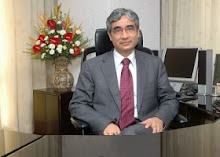By MUKUL SHARMA
Last month was the 40th death anniversary of psychologist Abraham Maslow who, in many ways, turned the study of human nature on its head. Before his writings -- spanning some three decades till his death in 1970 -- started making waves with mainstream research on the subject, most psychologists had arrived at their conclusions about mental health based only on abnormal human behaviour. So Maslow decided to study supremely normal human beings instead.
“It is as if Freud supplied us the sick half of psychology,” he wrote in 1968, “and we must now fill it out with the healthy half.” In other words since there were two faces of human nature, therefore there should be two faces of psychology too. His decision to learn more about people who were well adjusted, well adapted and optimally functional led to some startling breakthroughs.
Underlining the obvious, Maslow began with what he called a basic hierarchy of needs. To begin with, he said, there are the physiological needs such as the requirement for air, water and food without which we can’t survive. Once these are fulfilled there come the security and safety needs like shelter, clothing, protection and a degree of stability. The next level comprises love and belonging needs for partners, children, friends and relationships. The last of these basic levels are the esteem needs: status, fame, recognition, reputation, respect, appreciation, dignity, freedom.
They are what can be called “deficit needs” which have to remain in equilibrium. That is, if a person suddenly or even gradually doesn’t has enough of any one of them, he or she climbs down to the relevant level and tries to attain it again in order to maintain the balance. On the other hand, if one has all or most of them of them then that somehow seems to be it. Nothing more to want, no imbalance felt and, thus, no motivation left.
The next and final level in the hierarchy, however, is a dicey one because it’s not a deficit need. Rather it’s a “being need”, the need for actualisation to realise one’s full ethical, moral and spiritual potential. And, most importantly, this growth motivation never reaches a balance once it’s set in motion because it tends to feed its own hunger for increase.
Here is where Maslow turned to models of humanity who seemed to be above normal as opposed to the dysfunctional models studied in the past and this included people like Abraham Lincoln, Einstein, Albert Schweitzer, Spinoza and Aldous Huxley among others. In particular, one historical figure he found helpful in understanding self actualization was Lao Tzu, the father of Taoism. A tenet of Taoism is that people do not obtain personal meaning or pleasure by seeking material or merely self-gratifying possessions.
But then he made an astonishing discovery. He found that such people who appeared to be in harmony with their lives often had moments of an extraordinary occurrence called “peak experiences”. These are profound moments of intense rapture and well-being, along with possibly the awareness of ultimate truth and the unity of all things. Accompanying them is a heightened sense of control over the body and emotions and a wider sense of awareness.
Not long before his death Maslow coined and defined the term “plateau experience” as a sort of continuing peak experience that is more voluntary and one that requires a lifetime of long and arduous effort. Interestingly, Maslow believed something that we all actually know if we think about it -- that the origin, core and essence of every high religion is “the private and lonely personal illumination, revelation or ecstasy of some acutely sensitive prophet or seer” living in such a plateau of existence.
- mukul.mindsport@gmail.com
Published in The Speaking Tree - a Times of India Publication - on Sunday, 18 July 2010
CitizenSBI Blog expresses sincere gratitude to the author for permission to post this article.





No comments:
Post a Comment